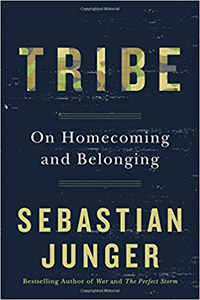
Sebastian Junger, Tribe; On Homecoming and Belonging (New York: Twelve, 2016), 168pp.
If Sebastian Junger's name rings a faint bell in your mind, that could be because of his four previous best-selling books, or his work as a contributing editor to Vanity Fair, but I suspect it's because he was also a co-director with Tim Hetherington of the award-winning documentary film Restrepo. This short book originated with a 2015 article in Vanity Fair.
Why is it, asks Junger, that western society, with all its material wealth and privileges, is such an unappealing place and way to live for so many people? Surrounded by others, we live unconnected lives that can feel "deeply, dangerously alone." Our affluence seems to breed isolation. Our high rates of suicide and depression are well known.
There are many costs associated with our western way of life, says Junger, but "the most dangerous loss may be community," or what he calls a "foundational lack of connectedness." We hardly know our neighbors. We are made to feel superfluous if not downright useless.
What we lack is a "tribe," a place where we are needed and wanted. A place that asks us to sacrifice for one another out of a sense of collective loyalty, responsibility, solidarity, and courage. Your tribe is "the people you feel compelled to share the last of your food with."
Junger explores all sorts of counter-intuitive examples of "tribe," like in the 18th century where white men, sometimes captives and sometimes voluntarily, rejected "civilized" society in favor of living with Indian tribes. The worst of times, like natural disasters or times of war, are known to bring out the best of social resilience and bonding in people. Many combat veterans speak of wanting to return to war because of the deep social bonding and the sense of giving themselves to a higher calling of something important.
One could argue that Junger romanticizes life in tribal societies to make his point. And isn't it true that often times natural disasters and war bring out the worst in people, like the chaos in New Orleans after Hurricane Katrina? There is also a thin line between a healthy tribe and a toxic tribalism. Still, I appreciated Junger's basic message, that we all need a shared sense of humanity despite our obvious differences, and that in our modern world that's a "rare and precious thing."


